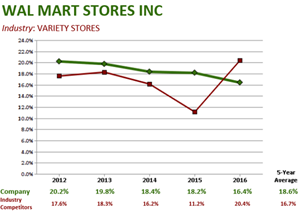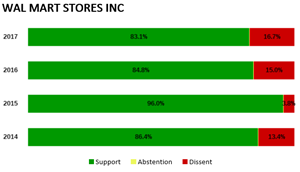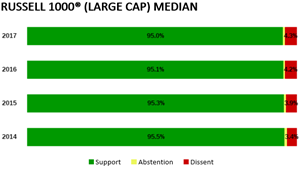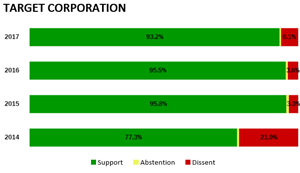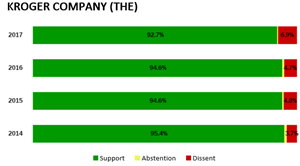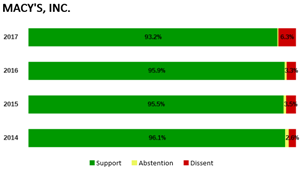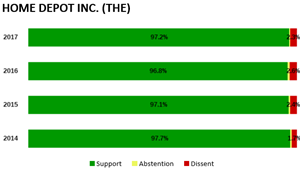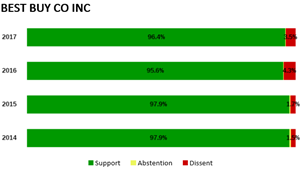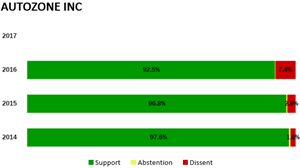|

Walmart's $20
Billion Buyback May Be Bid to Forestall Potential Activists
Its $20 billion buyback
plan could signal trouble in paradise.
By
Cathaleen Chen
Oct 13,
2017 11:48 AM EDT
Wal-Mart
Stores Inc.'s (WMT)
$20 billion stock buyback program could be a bid to quiet dissent
among a group of increasingly restive institutional shareholders, even
though the massive family-owned retailer doesn't now face any known
activist threats.
Stock
buybacks, a standard practice for companies to boost the value of
existing shares and show they are in top shape, also serve as a
strategic tactic to appease shareholders, financial experts told
TheStreet. That could be the case for Walmart, which announced
the buyback as part of its earnings outlook report Tuesday, Oct. 10.
Keeping
institutional shareholders happy with buybacks could be seen as a
preemptive defense against any future issues, sources said.
"They're
obviously appeasing potential dissident shareholders," said Gary
Lutin, chairman of the Shareholder Forum, an online database for
corporate information. "The Walton family owns a large portion of
shares, but that doesn't mean the company is invulnerable to activist
threats."
By
increasing the stock price, Walmart's buyback program "keeps the
hedge-fund activists happy," said William Lazonick, an economics
professor at the University of Massachusetts who has penned extensive
articles arguing against buybacks.
The Waltons,
the founding family of the Arkansas-based retailer, own more than 50%
of the company. Walmart's other largest shareholders are institutions,
including the Vanguard Group Inc., which owns nearly 14% of shares and
SSgA Funds Managements Inc., with 3.5%. Given the Waltons' stake in
the company, it's not an attractive target for activist investors—that
is, unless long-term players invite them onto the board.
Walmart's
shareholder support rankings point to some unhappiness within the
company, Lutin told TheStreet. Vanguard and SSgA could not be reached
to comment for this story.
The support
ranking, or the percentage of shareholders that disapprove of
executives' pay, is relatively high at 16.7% in 2017, according to
Forum data compiled from the SEC. The percentage looks at total votes
cast in advisory "Say on Pay" shareholder approvals of executive
compensation.
Although
the vote is about compensation, the Say on Pay question can be viewed
a measure of shareholder approval, according to Josh Black, the
editor-in-chief of Activist Insight, a news and data provider on
corporate governance.
"It's
certainly a litmus test for dissent and happiness," he told TheStreet.
"They could disagree based on specific reasons, or vote in a way of
making a general statement about the company."

Walmart and activism?
|
Walmart's
16.7% rating exceeds the average of 4.3% for the components of Russell
1000 and could signal disharmony among shareholders. Target
Corporation (TGT)
, for instance, saw a 6.1% dissent rate in 2017. Kroger Company (KR)
reported 6.9% and Macy's (M)
had 6.3%.
ProxyInsight, a database that tracks proxy reports, names BlackRock,
AXA Investment Managers, and ING as among Walmart's institutional
investors that voted no. The latter, for instance, said the reason for
its vote is Walmart's "non-rigorous goals."
"Both
annual and long-term incentives for fiscal 2017 performance were
earned above target against largely non-rigorous goals, despite the
fact that actual performance for a number of incentive measures
actually declined for the year in review," ING wrote as its rationale
for the June 2 vote, according to ProxyInsight.
But despite
the vote on executive compensation, Walmart's screen on activist
vulnerability is pretty low, Black told TheStreet.
Not
everyone is skeptical of Walmart's motives when it comes to its
buybacks. Brian Nagel, an Oppenheimer analyst, told TheStreet that the
buyback doesn't represent a strategic play as much as it is a
"reflection of confidence on the part of management."
"As
retailers mature, despite the investments they make, they still
generate a lot of cash," he said. "Home Depot (HD)
, Best Buy (BBY)
, Auto Zone (AZO)
—they've all done it."
Walmart
itself claims the buybacks are nothing more than a way to invest in
its own business and earn a decent return for shareholders, according
to company spokesman Randy Hargrove.
"Because of
the strong cash flow we generate, it gives us the opportunity to buy
part of our company and shows the trust we have in our strategy and
that we feel comfortable about the company's value," he said in an
email statement Tuesday.
While
Walmart has never seen a proxy fight, shareholder disruption wouldn't
be new. The retailer faced some institutional challenges following a
bribery scandal that erupted in 2012, in which the New York Times
unveiled that the company not only paid more than $24 million in
bribes to obtain building permits throughout Mexico, but also buried
its internal investigation of the case. In 2014, the company disclosed
that it had paid $439 million over two years on investigations related
to possible violations of the Foreign Corrupt Practices Act in Mexico,
China, Brazil and India.
In the
fallout of the bribery scandal, its shareholder vote for the board of
directors reflected unprecedented dissent against top executives,
including then-CEO Mike Duke, with 13% of the 3.4 billion shares
voting against Duke's position on the board, the AP reported in June
2012. Then, in 2014, four shareholders including Amalgamated Bank's
LongView Funds and F&C Management Ltd waged a campaign for Walmart to
disclose how they've held accountable the executive involved in the
FCPA investigations.
Still,
Walmart has an extensive track record in repurchasing shares.
"In the
decade 2007-2016, Walmart did $67.3 billion in buybacks, equal to 45%
of profits, and another $51.2 billion in dividends, equal to 34% of
profits," Lazonick told TheStreet in an email, citing SEC data.
© 1996-2017 TheStreet,
Inc. |

